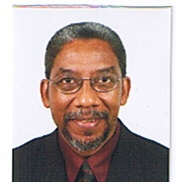|
Motion to Accept or Reject PSC Nominations Postponed: Exposed: Complete Disaster That Is the 2006 Recruitment Process Yesterday, February 2, Parliament met to complete another step in the Recruitment Process for the appointment to the 2 top offices of the TT Police Service.
The Parliament, as required by section 123(5) of Constitution (amended in 2006 to create the present Recruitment Process) had a single decision to make: To Accept or Veto the nominations from the Police Service Commission (PSC). Instead, of saying Yea or Nay to the nominees for Commissioner and Deputy Commissioner, Parliament postponed the decision. Why? Because of another disastrous flaw in the Recruitment Process - created by the very Parliament by amending our nation’s Constitution. The flaw: The process requires a Parliamentary decision, however if fails to provide for Parliament to be provided with sufficient information to make that decision on a proper informed and transparent basis. This is what lies behind all the arguments given by the Prime Minister for the postponement of the decision. However, he and the entire Parliament twists or turns the matter; However, the politicians and the media spin the issues and cast blame on each other or the PSC or the President, the FACT remains that the fundamental reason the decision was postponed is that the Recruitment Process instituted in 2006 is fundamentally and fatally flawed. Listen, to the PM’s preamble and this FACT becomes obvious. A LENGHTY AND UNNECESSARY DEBATE Parliament was given veto power over the nominations of the PSC for the top posts in the Police Service, instead of the PM (who had that veto power under the 1962 and 1976 Constitutions) by the 2006 Constitution amendments. Section 123(5) says: “The Police Service Commission shall appoint the Commissioner or Deputy Commissioner of Police ONLY AFTER the House of Representatives approves the Notification in respect of the relevant office.” What the Constitution DOES NOT SAY is on what information the Lower House of the Parliament is to logically and properly decide whether to approve or reject (veto) the PSC nominations. In an attempt to correct this obvious deficiency in the Recruitment Process created by it in 2006, this Parliament in 2015 (under THIS PM and Government) through an Order (published as Legal Notice No 218 of 2015) to give detailed direction to the very process said this: “(3) With respect to the nominations submitted in accordance with the procedure set out in section 123 of the Constitution, the Commission shall also submit a dossier in respect of each candidate so nominated. (4) The dossier referred to in subclause (3) shall contain the following: (a) application of the candidate; and (b) the biography or résumé of the candidate.” In other words, Parliament decided in 2015 that ALL the information the PSC is to provide to the politicians in the Lower House to decide whether to accept or reject its (the PSC’s) nominations is 1) a copy of the nominees’ application and 2) the nominees’ biography or resume. THAT IS ALL! So, according to section 123(5) of the Constitution and the Orders made under it (All approved by the Parliament) the ONLY INFORMATION that the Lower House requires to decide who the Commissioner and Deputy Commissioner are, is their Application Form and CV! But, the very Lower House engaged in a lengthy and totally unnecessary debate in refusing to decide to accept or reject the PSC’s nominations by making an excuse that they did not have enough information about the “process” and about “matters in the public domain”. The very Law, made by Parliament says all the information they are required to have is: An Application Form and a Curriculum Vitae of the Nominee. All that we were forced to witness yesterday (on both sides) was an exercise in smoke and mirrors to hide from the population that Parliament had already decided the ONLY information that was required was already in their possession. PARLIAMENT COVER UP Let us examine the reasons given for the postponement of Parliament’s decision: What the Prime Minister said:
The Opposition Leader, for her part, also added:
Well, here is the House of Representatives which, under law, as the PM puts it, is to make a decision whether to accept or veto nominations with information contained in the nominees’ Application Forms and Biographies and Resumes, as required by Law made by the same Parliament. But, this House sets up a Select Committee to consider things other than what the Law requires to be given to the House to make that decision. CROSSING THE LINE OF SEPARATION OF POWERS? Worse, the Committee of the same House is to “determine matter of law and fact” according to the Opposition Leader. This House is now seeking to go beyond what its own Law regarding the Selection Process (the Constitution it changed in 2006 and the Order in LN 218 of 2015 that it approved) to decide matters that ought properly to be determined by a Court of Law and not the Legislature. Courts decide matters of Law and Fact. Courts decide if actions of a Service Commission are intra vires the Law and process established by the Order approved by Parliament. Courts decide if a Service Commission act fairly and without bias. The Parliamentarians are to decide, based on the dossier the PSC is required to supply the House, if they accept or reject the nominations of the PSC for the post of Commissioner and Deputy Commissioner, and nothing else. For Parliament to do or try to do more would be stepping outside of its role set out in the Constitution and the subsidiary legislation made under section 123 of the Constitution. For Parliament to decide things suggested in the House for the Select Committee to do “to have questions answered before the House proceeds any further” as the PM suggested, means that the House is taking onto itself the role of the Judiciary. If any candidate thinks that there any bias against him, or anything improper or unfair done by the PSC in arriving at its nominations, he can approach a Court for Judicial Review of the decision. If any candidate thinks that any of his Constitutional rights have been or are about to be violated by the PSC, the Selection Process or otherwise, he can approach a Court on Constitutional Action. Thanks to Reginald Dumas, if any citizen thinks that there is anything that violates the Constitution in this business of the Selection of a Commissioner and Deputy Commissioner of Police, he can, in the public interest, approach a Court on Constitutional Action. For Parliament to take on the role of deciding those matters for itself, as it is attempting to do, is in my view, crossing the line and violating the Separation of Powers which is a principle of our Constitution and our Democracy. WHY ALL THIS? Why is Parliament doing all of this? Why is Parliament attempting what the Leader of the Opposition admits is an ‘unprecedented step’? The reason is that the interference with the powers of the Police Service Commission and giving a “plentitude of its powers to the Commissioner” (Opposition Leader) and creating an “unacceptable, cumbersome and expensive” Selection Process (Prime Minister) all done when the Parliament tinkered with the Constitution and the Police Service Act in 2006 created a totally flawed and unworkable situation for the management of the Police Service. It is the completely confused thinking of the Parliament in doing what it did in 2006 that has created the situation in the Police Service that the Prime Minister said yesterday “is in dire need of revolutionary leadership.” Both the PM and Opposition Leader were part of the Parliament which unanimously made those changes. But, they both accept no responsibility for the mess that exists. So, speakers on the motion to set up the Select Committee ended up in that unnecessary debate, trying to blame either the PNM or the UNC for the changes they all passed in 2006. One MP who was also there in 2006 said yesterday “..there was this zeal to see our Parliament go in the direction, for better or for worse, of the American Congressional system where a sub-committee of the American Congress would meet to discuss appointments and so on and quiz…(nominees)”. What Oropouche East MP admits is that in 2006, the politicians changed our Constitution to try and make something happen that is proper in an entirely different Constitutional arrangement in another country. The Leader of Government Business, wound up the debate by quoting from the Order for the Selection Process and did not include the changes made to that Order by the Court in 2016 in the Haridath Maharaj case. This only compounds the issue of the Parliament refusing to accept responsibility for the matter and going so far as to misrepresent what the law in fact is. That may be excusable for talkshow hosts and opinion columnists. Certainly not for a senior member of Parliament and Government. This is the nana of the matter, as a colleague used to say. The heart of the problem is that Constitutional change was made for expediency, and not as part of an overall and considered change to our Governance arrangements. The fact that the entire Parliament agreed to this unacceptable, cumbersome and expensive process and unleashed a managerial and performance disaster on the Police Service does not change the nature and effect of what was done in 2006. The real need in our failing governance system is for a thorough and comprehensive overhaul, a democratic renewal of our political and electoral processes and governance arrangements. What we are reaping now is the whirlwind of disaster generated by sowing the wind with ad-hoc piece-meal Constitutional change which was really for the self-serving aims of politician of strengthening their hand in determining the holders of public service office. What was decided yesterday will only make it worse. (3 February 2018)
ROMEL LALLOO
4/2/2018 08:28:41 am
I hav emade my comments to several promenent politician and a lawer about this matter motion in parliament into psc appoint of police commissioner.
Clyde Weatherhead
5/2/2018 06:17:07 am
Romel, you should speak up publicly about this matter. Comments are closed.
|
AuthorI am a appalled at the loss of the simple skills of discussing ideas and sharing Opinions to DEEPEN ANALYSIS and UNDERSTAND DEVELOPMENTS to ARRIVE AT SOLUTIONS. Archives
April 2024
Categories |

About Clyde Weatherhead
Clyde has been involved in public life as a political activist, a trade unionist, Lawyer, Teacher and Author |
Connect With Clyde
Write to Clyde on Facebook Visit Clyde's Author Page on Amazon Go To Discussion on Facebook For Employment Relations Issues |

 RSS Feed
RSS Feed